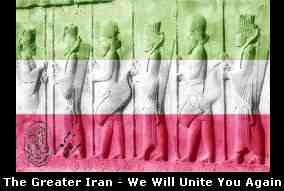US Encouraged by Tehran's Enemy Within - The Guardian

Increased repression and unrest affecting Iran's numerous ethnic and religious minorities are providing new opportunities for the US as it steps up efforts to destabilise and if possible bring down the hardline Islamic government of President Mahmoud Ahmadinejad.
Kurdish sources say persecution of Iran's estimated six million Kurds, who mostly live in western provinces bordering Turkey and Iraq, has intensified since Mr Ahmadinejad came to power. Weeks of turmoil followed his election last July - and is continuing. Ten Iranian Revolutionary Guards were killed in the latest clashes this week in Salmas and Kelares, according to Iranian and Kurdish reports.
Although groups such as the Kurdistan People's Democratic party have renounced violence, the Kurdistan Free Life party, affiliated to the Turkish separatist PKK, has carried on the fight. More than 120 members of the security forces are said to have died in the past year.
"The Kurdish population has long been viewed with suspicion by the Iranian authorities and has experienced decades of official neglect," Amnesty International reported in February.
"The months since Ahmadinejad came to power have seen no improvement. On the contrary, there have been signs ... of a further harshening of repression.
"Despite constitutional guarantees of equality, individuals belonging to minorities, believed to number about half Iran's population, are subject to an array of discriminatory laws and practices, including restrictions on social, cultural, linguistic and religious freedoms which often result in human rights violations."
Ibrahim Dogus of Halkevi, a Kurdish and Turkish community organisation, said Kurdish leaders wanted international support to end human rights abuses. But any regime change in Tehran should "come from the bottom" rather than be imposed from outside, he said.
Ethnically Arab Khuzestan province, in south-west Iran, has witnessed several recent bomb attacks, including a rumoured attempt to assassinate Mr Ahmadinejad in Ahvaz in January. The attacks have been attributed to separatists. But Iranian officials blame Britain, whose troops occupy adjacent areas of south-east Iraq, and its US ally for instigating the violence.
Coincidentally or not, "British intelligence" was also officially accused of colluding with "bandits" in Sistan-Baluchestan this month after 21 government officials were shot dead. Like separatists in Khuzestan, the south-eastern province's large ethnic Baluchi Sunni population has long protested about discrimination by the Persian Shia majority.
Iran's leaders also face stirrings of discontent in the north-east, home to two to three million ethnic Turkmen. According to Muhammad Tahir of the Institute for War and Peace Reporting, Turkmen say the Persian language, dress codes and customs are being forced on them. "Sunni Muslims in a theocratic Shia state, they feel disadvantaged for both ethnic and religious reasons."
Government fears about the "enemy within" may have been reflected in a recent move to further pressure Iran's Baha'i community, which is not allowed to practice its faith and has often been subject to persecution at times of national strain. The UN condemned the move as "impermissible and unacceptable interference with the rights of religious minorities". A renewed crackdown on student groups has also been launched.
External pressure from non-Persian and mostly non-Shia minorities is being applied via the exiled Congress of Iranian Nationalities, which issued a manifesto in London last year. The congress demanded a federal Iran, separation of religion and state, and an end to all forms of discrimination.
President George Bush's national security strategy, published this month, again urged Iranians to rise up against their "oppressors". But whether the US can or should try to exploit Iran's ethnic and religious fault-lines is a matter of debate in Washington. Officialdom is split between those who fear triggering an uncontrollable, Iraq-style disintegration; and those, notably in the Pentagon, who think they see a way of dishing the mullahs where snail-paced UN diplomacy and high-risk military threats have so far failed.
Iranian officials say western attempts to divide the Iranian nation, forged in revolution and a bloody war with Saddam Hussein, are bound to fail. They are especially scornful of regional Arab and Iranian diaspora hopes of encouraging change from without. But nerves are jangling all the same.
Today will see the beginning of Noble Prophet, a large-scale Iranian military exercise along the length of the Gulf, the area where any future military attacks might be expected.
Rear-Admiral Morteza Saffari said the wargames would start with the firing of a Shahab-2 medium-range missile. The launch of this formidable weapon, he told an Iranian news agency, was intended as "a message of peace and friendship" to all Iran's neighbours. The admiral's grimly ambiguous greeting conveyed a blunter warning: Keep Out.
Original Article
.42.jpg)


0 Comments:
Post a Comment
<< Home